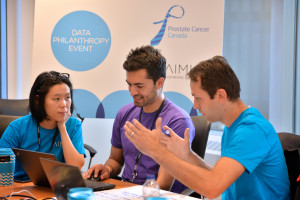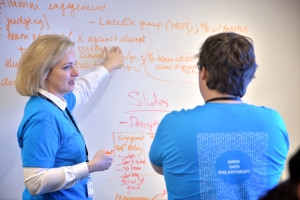In our ongoing series profiling companies making a difference in their communities, we look at Aimia Inc., a data-driven marketing and loyalty analytics company (and the parent company of Aeroplan) that completed its third annual data philanthropy event last week. In a little more than 24 hours, approximately 75 of Aimia’s data scientists and experts came together and sifted through several hundreds of thousands of records of data. The goal was to provide valuable analytical insights and recommendations to four non-profit organizations – Ballet Jorgen Canada, Enactus Canada, The Stephen Lewis Foundation, and Prostate Cancer Canada – in order to analyze trends and patterns and make recommendations to meaningfully improve their programs. And so they did.
To better understand the event’s mission, its unique value and impact on the nonprofit sector, SEE Change spoke with Mike Poyser, Vice President of Aimia’s Analytics Division for Canada, Bengt Jörgen, Artistic Director and CEO of Ballet Jörgen Canada, Rocco Rossi, President of Prostate Cancer Canada and Nicole Almond, President of Enactus Canada.
Where did this idea for an event come about? How did you sense there was a gap in data analytics on the part of charities?
Mike Poyser: As global marketing and data analytics experts, we help our business clients garner insights from their data to help inform everything from their marketing campaigns to retail category management. Unfortunately, data analytics is not readily available to charities with smaller budgets and fewer resources– it is for the most part cost prohibitive and the expertise in this area often lacks. It was this reason that this event first came into existence. It offered us a way to share our skills and expertise with the charities that exist in the communities in which we operate. This is our third consecutive year hosting the event in Canada, and our other offices around the world also host their own similar data philanthropy events. The whole initiative is truly global, and helps to raise the sophistication of the participating charities in a way that has a long-lasting, sustainable impact.
How do you make such an impactful yet challenging day work?
MP: I think it is important to note that all of the employees who participate in our Data Philanthropy event volunteer their time through their own volition. We create the opportunity for them to do so, but it is their desire to give back, as well as their business expertise that really makes the event come to life. We at Aimia encourage skills-based volunteering as we firmly believe it is an impactful way to support our communities. By sharing skills and business expertise, companies can help local charities and not-for-profits accomplish things that would otherwise be difficult for them to do on their own. Team leads from Aimia work with each charity a month in advance of the event to identify and organize the data that will be available during the event, and to determine the key business questions that each charity wants to answer. This process allows for the 48-hour event to be really impactful. Over 1,200 hours were volunteered in total for this year’s event.
What is the mood of the day with 75 participants busily sifting through mounds of data in a 48-hour period?
MP: As with years past, the positivity exuded from each of the participants was palpable. In my view, I thought the quality of the insights, the commitment from the teams, and the output for the charities was outstanding. Each of the four groups was able to provide new and comprehensive insights for their respective charity. I had a chat with each of the charities after the session, and they were all equally enthusiastic about and extremely grateful for the work that had been done. For us to hear that we have had a positive impact and provided some useful insights to the charities makes the hard work completely worth it.
How important is it to have an organization like Aimia use their expertise to help you with data analytics?
Bengt Jörgen: As a not-for-profit organization, the time and resources to dedicate to such a sophisticated form of analysis are not available to us. Having an organization like Aimia lend us their knowledge and expertise is invaluable and extremely beneficial.
Rocco Rossi: We would be unable to put the necessary resources and expertise towards this type of data analysis on our own.
Nicole Almond: Having Aimia’s expertise in data analysis was truly invaluable for Enactus Canada. As a small charity we have limited resources and limited staff, both of which we direct towards programming whenever possible in order to engage the greatest number of students. Having a company like Aimia donate their resources and knowledge was like adding an entire department to our organization, one dedicated to demonstrating the impact of our work.
Can you discuss one or two things that you’ve learned with their help?
BJ: Through Aimia’s insights we have a better understanding of the specific audiences that we are reaching through our education and outreach programs, as well as our touring initiatives. The data collected will better equip us to target our programs to our diverse range of stakeholders. We are dedicated to building and maintaining relationships with the communities in which we perform and through these insights we look forward to developing ways to further engage and connect with our audiences.
RR: The importance of asking the right questions of a data search, as well as collecting consistent information along all data entry points/systems.
NA: Post-secondary students who are part of Enactus have a faster career trajectory, are promoted twice as often and are three times more likely to be involved in start-ups. This is powerful data to have as an organization. Enactus Canada can now say with authority, that our organization shapes entrepreneurial leaders.
Will you be taking any different steps with your programming as a result of your new learnings?
BJ: Canada’s Ballet Jörgen will continue to harness the power of data thanks to the business reporting tools and dashboards provided by Aimia. In the interest of further engaging our audiences, we will also dedicate time to developing and implementing a social media strategy that reflects the company’s commitment to ballet education and being builders of dance from coast to coast in a virtual context to accompany our programs.
RR: We will be taking a more tailored approach to the collection of information to enable us to optimize our database, and, consequently, better support our mission.
NA: The process has demonstrated the vital importance of consistent data collection and will certainly impact how we track, manage and analyze programmatic information moving forward. In addition, these learnings have demonstrated we are achieving our mission of shaping generations of entrepreneurial leaders and validated the anecdotal information we’ve been collecting for decades. This will undoubtedly open up countless opportunities for us as an organization and as a growing community.


